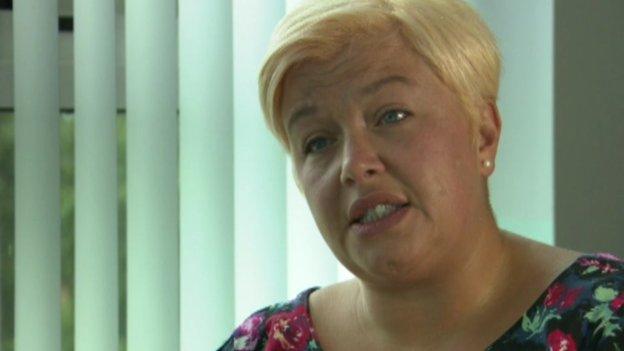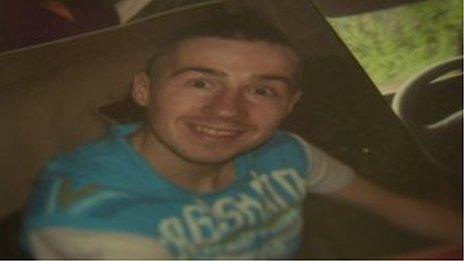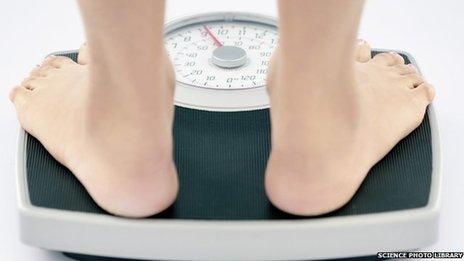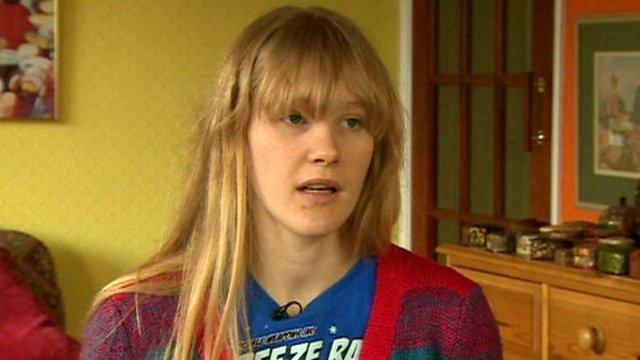Anorexia treatment at Beechcroft unit in Belfast criticised
- Published
Aoife Boyle said she felt like she had been 'imprisoned' while at the Beechcroft unit
The family of a teenage girl who has anorexia have discharged her from hospital because they are so unhappy with her treatment.
Aoife Boyle was being treated at the Beechcroft unit in south Belfast, Northern Ireland's only inpatient facility to treat children with mental health problems.
Care at the unit has been criticised by other families.
However, those in charge have said they are listening to parents' concerns.
Aoife was 14 when she was admitted at the end of May.
She had barely eaten anything for 10 weeks, her weight had plummeted and she was seriously ill. The treatment she received was not what she or her parents expected.

The Beechcroft unit is Northern Ireland's only inpatient facility to treat children with mental health problems
"I hated every minute of it," she said. "I felt like I'd been imprisoned. I wasn't allowed to stand - that was considered exercise. I wasn't allowed to walk anywhere in case I harmed myself.
"I was getting told if you don't eat that, you know what's going to happen, in a really threatening way, which really frightened me."
Aoife's father, Fergus, said that when she was first admitted the family were full of hope.
"We thought this is it, we're going to get our daughter back. But that wasn't the case," he said.
"We felt excluded from the outset, we didn't see or speak to a psychiatrist the whole time she was in. It's little wonder she didn't want to eat. She had someone watching her 24 hours a day."
'Not informed'
Aoife ate nothing while she was in Beechcroft and her health deteriorated so badly she was moved to Belfast City Hospital for tube feeding, where she remained for four weeks.
It was there that another problem arose - Aoife was prescribed an anti-depressant as soon as she arrived at Beechcroft.

Beechcroft's children's services manager, Billie Hughes, said plans were in place to keep young people safe
"When she was in the City Hospital, that was increased by 100%," Mr Boyle said.
"We weren't informed as parents. I found out by looking at Aoife's chart at the end of her bed."
Billie Hughes, the children's services manager at Beechcroft, said she cannot comment on individual cases, but that plans are in place to keep young people safe.
"The views of young people and their parent/carer are important in the continued development of the care plan, and both are requested in writing before care planning meetings," she said.
On prescribing drugs, she said: "With anti-depressants, we would usually prescribe a half-treatment dose to monitor for any side-effects, prior to prescribing a treatment dose and this would be discussed. Any further increases or changes would be discussed."
"Young people are also invited into care planning meetings to discuss their care plan and changes. There is also independent advocacy to support them in this process."
Aoife described having an eating disorder as "hell in your head", but she said, for her, Beechcroft was not the answer: "I physically couldn't go back in there - it's just something I couldn't do."
Her parents are now paying a private psychologist who they hope will give their daughter the help she desperately needs.
- Published18 February 2014

- Published30 January 2014

- Published30 January 2014

- Published29 January 2014
